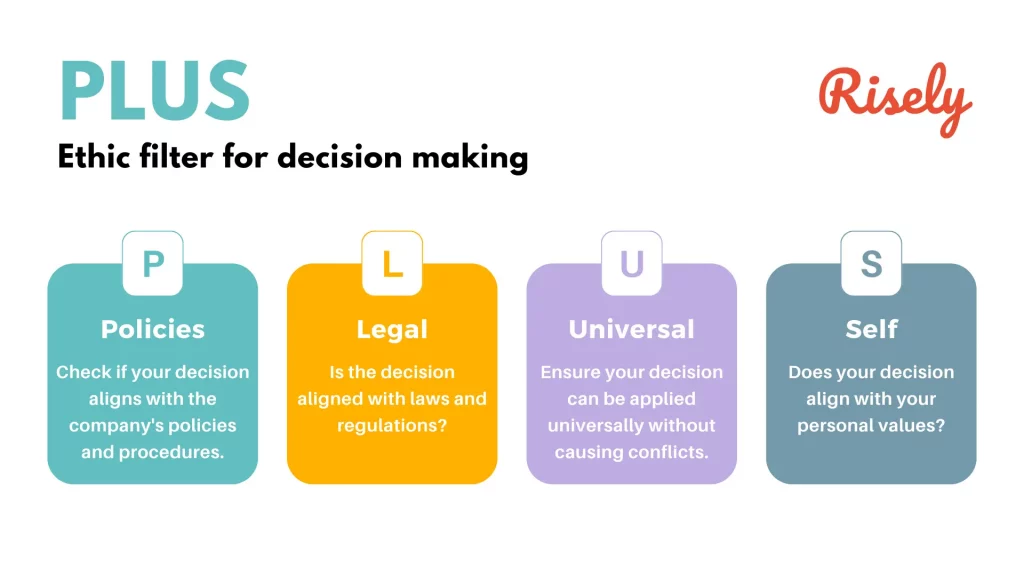6 Step Process For Ethical Decision Making: A Guide with Examples
Ethical decision making is determining the ethicality of a decision, action, or course of action and weighing ethical considerations against ethical principles and personal values. For example, decisions are not moral if motivated by profit or other interests rather than principles such as honesty, fairness, or respect for others. To make ethical decisions, it helps to understand ethical decision-making. There are many different models for ethical decision making. Most revolve around five principles: fairness, impartiality, voluntaryism/non-interference (or non-aggression), respect for rights and welfare, and the common good. But what do these principles mean? And how can you use them in decision-making? In this blog post, we will tell you all about it. First, we’ll introduce the five principles of ethical decision making, and then we’ll give you an extensive guide on how to make ethical decisions based on these principles.What is ethical decision making?
Ethical decision making is evaluating and choosing alternatives consistent with ethical principles and values. This involves considering moral obligations, individual rights and responsibilities, fairness, and the common good and balancing these considerations to determine the best course of action. The goal of ethical decision making is to make morally right and just decisions rather than simply focusing on personal gain or self-interest.Why do we need to make ethical decisions?
Ethical decision making is essential for several reasons. 1. Promotes moral behavior: Ethical decision making promotes moral behavior by encouraging individuals and organizations to consider the ethical implications of their actions and to act in accordance with principles of right and wrong. 2. Protects the rights and interests of others: Ethical decision making helps to protect the rights and interests of others by ensuring that individuals and organizations do not engage in actions that cause harm or violate the rights of others. 3. Maintains public trust: Ethical decision making helps to maintain public confidence by demonstrating that individuals and organizations are committed to doing what is right rather than just what is profitable or convenient. 4. Enhances reputation: Ethical decision making enhances the importance of individuals and organizations by demonstrating a commitment to high ethical standards and values. 5. Facilitates decision-making: Ethical decision making can facilitate decision-making by providing a clear framework for evaluating different options and determining the best course of action. 6. Promotes long-term success: Ethical decision making can promote long-term success by establishing a positive reputation, fostering trust, and avoiding costly legal or reputational consequences. Here are 8 tips that you should follow if you aim to become an ethical manager!OtherInterestingReads
6 Steps of Ethical Decision Making
Ethical decision making is a systematic approach to evaluating and choosing among different options in a manner consistent with ethical principles and values.
Example of Ethical Decision Making for a Manager Based on the Steps outlined above:
1. Identifying the problem: A manager at a manufacturing company has been informed that one of the raw materials suppliers has been using child labor. 2. Clarifying values and ethical principles: The manager realizes that the company has a strict policy against child labor and is also against the company’s culture and values of promoting fair and honest business practices. 3. Generating alternatives: The manager considers several options, such as switching to a different supplier, working with the current supplier to improve their labor practices, or discontinuing the use of the raw materials altogether. 4. Evaluating alternatives: The manager evaluates each option based on their impact on the children involved, the company’s reputation, and the potential financial implications. The manager also considers the company’s commitment to promoting fair and ethical business practices and the impact on other stakeholders, such as customers and employees. 5. Making a decision: The manager decides to discontinue using the raw materials from the supplier and to look for a new supplier that adheres to the company’s strict standards against child labor. 6. Implementing and monitoring the decision: The manager implements the decision by informing the relevant departments and finding a new supplier. The manager also monitors the situation to ensure that the new supplier is not using child labor and that the decision remains consistent with the company’s ethical standards. This example shows how a manager can use ethical decision making steps to address a moral dilemma consistent with their values and ethical principles. It demonstrates the importance of considering multiple options, evaluating the impact of each decision on different stakeholders, and taking action that aligns with the company’s values and commitments. Here is how mental models help in effective decision making as a manager!3 Ethical Decision Making Examples in the Workplace
1. The Confidential Data Dilemma Imagine you’re a project manager working on a high-stakes project. You discover a team member unintentionally left a folder containing sensitive client information on a shared computer. You’re faced with deciding whether to access the folder and review the data to ensure security. Ethical decision-making prompts you to consider your obligation to protect client privacy. You resist the urge to look and instead notify the team member, showing your commitment to ethical principles and trust within the team. 2. The Budget Crunch Call: You’re a department head responsible for allocating the annual budget. There’s immense pressure to cut costs this year, and you’re aware that reducing employee training funds would help meet the budget target. However, investing in employee development is crucial for their growth and the company’s long-term success. Ethical decision-making guides you to prioritize the development of your team, even if it means finding alternative ways to make the budget work. 3. The Whistleblower’s Crossroads: Picture yourself as a senior executive in a large corporation. An employee approaches you with evidence of potential financial misconduct within the company. You’re torn between addressing the issue internally to protect the company’s reputation or reporting it externally to ensure transparency and accountability. Ethical decision-making encourages you to put the values of honesty and integrity above all else. You decide to initiate an internal investigation while providing the whistleblower’s protection.5 Approaches of Ethical Decision Making
1. Utilitarianism: Maximizing Happiness
Utilitarianism encourages decisions that result in the greatest overall happiness for the majority. In a workplace context, this means considering the well-being of both employees and stakeholders when making choices.Imagine your company is deciding whether to adopt a new cost-cutting strategy that could lead to layoffs. A utilitarian approach would involve weighing the potential benefits of preserving the company’s financial health against the negative impact on employees’ livelihoods.
2. Deontology: Upholding Moral Rules
Deontology focuses on following moral rules and principles, regardless of the consequences. It’s about doing what’s right based on established ethical standards.As a manager, if you discover an employee has made a mistake that could harm the team’s project, a deontological perspective would mean addressing the issue transparently and finding a solution, even if it might initially cause discomfort.
3. Virtue Ethics: Building Good Character
Virtue ethics emphasizes cultivating positive character traits in individuals. This involves nurturing a culture of integrity, empathy, and collaboration in the workplace.A leader who consistently demonstrates empathy and actively listens to their team members helps build a virtuous workplace environment that values open communication and mutual respect.
4. Justice: Fairness and Equity
Justice in the workplace involves treating employees and colleagues fairly and equitably, ensuring everyone has equal access to opportunities and resources.During promotions, a just manager considers employees’ skills and contributions rather than favoritism, ensuring that deserving individuals are recognized and rewarded.
5. Rights-Based Ethics: Protecting Individual Rights
This principle focuses on upholding the fundamental rights and freedoms of individuals in the workplace, even when making challenging decisions.If implementing a new monitoring system, a rights-based leader would ensure that employees’ privacy is respected by implementing transparent policies and safeguards.
Conclusion
Ethical decision making is a challenging process. While there are many ethical decision-making frameworks, each person must choose the one that best fits their values and situation and still be able to understand how it works in practice. This decision-making process is dynamic and ever-changing, so it is essential to keep learning about ethical decision making principles and models. It’s also helpful to remember ethics is a personal subject that belongs to each individual. In addition, ethical decision making requires making ethical decisions (such as through ethical thinking and action) while considering the values of other people involved in the decision-making process (for example, by considering the needs of others or the consequences of unethical decisions).Is your team confident in your decision-making skills?
Discover insights with the free decision-making assessment for managers
Other Related Blogs
10 Signs You’re Struggling with Analysis Paralysis at Work
10 Signs You’re Struggling with Analysis Paralysis at Work The smart fox declares, “I have a hundred ways to escape when trouble approaches. You have only one.” As the dogs…
Evidence Based Decision Making: 4 Proven Hacks For Managers
Evidence Based Decision Making: 4 Proven Hacks For Managers In this blog, we will explore the concept of evidence-based decision-making and provide seven proven hacks for managers to implement evidence-based…
6 Best Books On Decision Making For Managers
6 Best Books On Decision Making For Managers Effective decision-making is crucial for managers to navigate the complexities of their roles. You are responsible for making important choices that can…
Best Decision Coaches To Guide You Toward Great Choices
Best Decision Coaches To Guide You Toward Great Choices Effective decision-making is more crucial than ever in today’s rapidly evolving business landscape. Entrepreneurs, leaders, and professionals alike are constantly faced…


